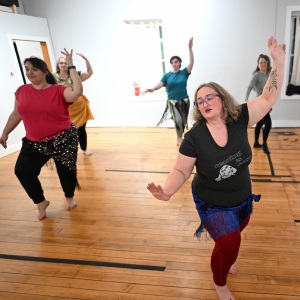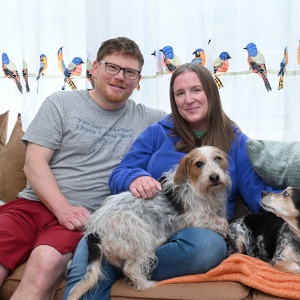Let's Talk Relationships: Vulnerability opens door to true self

| Published: 11-08-2024 1:25 PM |
What exactly IS emotional vulnerability? What comes to your mind as you read this phrase?
I imagine many of us cringe a bit, and are not comfortable at the thought of being vulnerable. To clarify, I define emotional vulnerability as revealing one’s inner world of feelings, thoughts, needs, insecurities, flaws, and experiences to another person. A tall order for many of us, but so worthwhile! Read on.
Having a thick skin, appearing strong and confident, and not showing any vulnerability is a value in our society that I believe needs to be challenged. Many of us feel anxious at the thought of exposing our authentic feelings, thoughts and needs since we may be uncertain about the other person’s response, and fear we may appear weak to them.
Along with the pervasive cultural message that vulnerability equals weakness, familial influences can affect us as well. If we have had abusive relationships or criticism from family members or others, such experiences can lead us to believe we are broken, and to fear that showing imperfections will be seen by others as weakness. It takes courage and strength to fight against these messages we have internalized from both the culture and from family dynamics.
Contrary to what many of us think, researcher Brené Brown, in her book “Daring Greatly,” asserts that vulnerability is in fact, powerful; she considers it to be the birthplace of love, belonging, joy, courage, and empathy. You can view her TED Talk video on vulnerability by searching: ”Brené Brown: The power of vulnerability.”
Feeling vulnerable is a normal part of life. It comes up in many relationship scenarios, such as: asking someone out on a date; expressing tender feelings we may have for someone; saying “I love you” first; sharing about difficult past experiences from our lives; speaking up when feeling unhappy, hurt, jealous, offended, etc.; expressing any needs we have in the relationship; and sharing things we struggle with or don’t feel good about regarding ourselves.
As we know, it is not always easy to be vulnerable. There may be things we don’t like or accept about ourselves, so we end up judging, denying, and hiding them from our partner. We may not want to risk revealing ourselves more fully, fearing we won’t be liked, loved or accepted.
When partners hide the truth of their thoughts, feelings and needs, though, they are essentially building walls that keep them apart.
Article continues after...
Yesterday's Most Read Articles
“It can’t be overstated,” says Canadian relationship counselor Joel Durkovic, that emotional vulnerability needs “to be shared by all parties to progress meaningfully and safely.” I have witnessed this in my work with couples, over and over again — that mutual sharing of their full selves, warts and all, is what actually creates the real connection and closeness they seek.
My observations align with world-renowned relationship researcher John Gottman, who has four decades of experience studying 40,000 couples, and who states that emotional vulnerability, when mutual, “is one of the primary ways to strengthen a marital bond and keep love alive.”
If you or your partner find it daunting to approach the practice of increased vulnerability in your relationship, couples therapy/coaching is a step you might want to consider. In these supportive and safe settings, I have seen couples make more progress than they ever thought possible.
Here are some questions to ponder:
1. How was vulnerability modeled in your family?
2. How has your gender influenced your willingness and ability to be vulnerable?
3. Rating from 1-10, easiest to most difficult, how easy is it for you to share with a partner feelings of __insecurity, __sadness, __hurt, __fear, __jealousy, __grief, or __shame?
4. When you have expressed some vulnerability to your partner, how did you end up feeling?
__relieved __supported __embarrassed __ashamed __regretful __closer __other
5. What might you need from your partner in order to feel more comfortable being vulnerable with them?
6. What is an insecurity you haven’t shared with your partner but would like them to understand about you?
7.How is it for you if/when your partner shares an insecurity of theirs with you?
8. Would you like your partner to feel more comfortable sharing their insecurities with you?
If so, what would you need to do differently to help them feel more comfortable?
9. If you are raising a child, or are planning to, what messages would you want to give them about vulnerability?
10. How might it benefit your relationship if you were each able to share vulnerability more easily with each other?
Emotional vulnerability is one of those topics that deserves more attention and discussion than it is normally given. Our relationships can benefit immensely from learning about and practicing shared vulnerability.
I am cheering you on to move into more self-acceptance of all the different parts of yourself and to know that you are worthy of love and belonging, just as you are.
It takes courage on both people’s part to co-create the profound understanding, connection, empathy and vitality that being vulnerable offers. Mutual vulnerability with loved ones can take relationships from “surviving,” being mediocre, distant, boring, hostile, or lifeless, to “thriving.” Wouldn’t we all enjoy the experience of feeling fully accepted and loved, with our imperfections held with care, and trust and safety being a shared treasure at the core of the relationship?
Amy Newshore is a couples therapist/coach who earned her master’s in clinical mental health counseling at Antioch New England University and went on to train in the Developmental Model for Couples Therapy along with nonviolent communication, which serve as the foundation of her work as a relationship coach. For more information visit her website at coachingbyamy.com.






 ‘I’ve met friends in my books’: Eric Carle Museum celebrates author, illustrator Grace Lin with retrospective exhibition
‘I’ve met friends in my books’: Eric Carle Museum celebrates author, illustrator Grace Lin with retrospective exhibition ‘You can just do it forever’: Belly dance classes and shows grow steady local following
‘You can just do it forever’: Belly dance classes and shows grow steady local following With a little help from his community: Northfield Mount Hermon teacher fighting rare form of cancer begins clinical trial
With a little help from his community: Northfield Mount Hermon teacher fighting rare form of cancer begins clinical trial Valley Bounty: Rain or shine, strawberries are here: Teddy C. Smiarowski Farm welcomes another pick-your-own season
Valley Bounty: Rain or shine, strawberries are here: Teddy C. Smiarowski Farm welcomes another pick-your-own season
